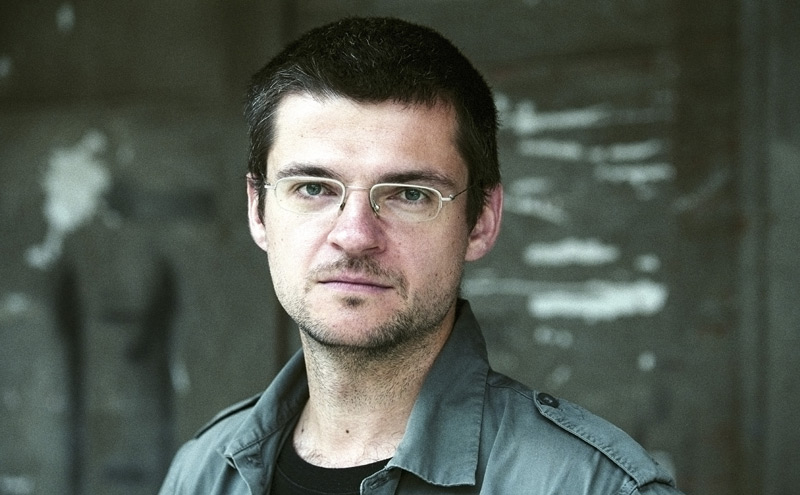about the production
Today the German Jewish author from Prague and his work, which should have been burnt according to the author’s wish, is known throughout the world. If not from books, then from films, t-shirts, coffee mugs and key pendants.
Kafka´s work has an exceptional meaning for Czech and Slovak culture of the second half of the 20th century. In the liberated cultural surroundings at the beginning of the 1960s (1963) there was a symposium taking place in Liblice, where Kafka´s work was re-discovered and became a part of editorial plans of local publishing houses. In the mid 1960s Jan Grossman staged The Trial at the Na zábradlí Theatre in Prague and for years on he established an interpretative tradition of this novel on the home stages. The unknown court in front of which the trial takes place, the participants of the trial (the investigators, the prosecutor, the defendant), whose authority cannot be queried by Josef K., despite the fact that it is not sure whether the institutions they represent exist, the pointless resistance of Josef K. against anonymous bureaucratic machinery – all of this in Grossman´s interpretation functioned as a picture of totalitarian society and its mechanisms.
There was yet another important thing in this production – Grossman approached Kafka´s work without the effort to create on the stage the analogies of “Kafka- like” text scenes. It is opposite, he staged The Trial on a plain stage and left the scenes to be developed in the heads of the audience. Similar approach was used also some generations later by director Dušan D. Pařízek. The actors, standing on an almost empty stage, with minimum acting means, speak the text rather than play it. Until this point it is an interpretation in the Grossman tradition. And it is here the similarity ends.
Pařízek uncovers the novel in a new way: the court, prosecution, investigators – all of them are in the inner self of Josef K. The Trial is not a process of fighting of an individual against his inner self – whether we call it superego or conscience, which accuses his acts and living; there is a feeling of guilt at the beginning and the need to deal with it. The acting and living on one side, the control (or reflection) on the other side found themselves in an unbalance and it is not clear – to us as well as to Josef K. – whether he caused this state of his by his acting, or self-questioning which follows every such acting.
Nevertheless, Pařízek does not neglect the social dimension of the novel – he sees similar deflexion, which happened to Josef K., also in the mechanisms of a social control, or more precisely, a social command. The fight of his Josef K. is therefore played not only in front of (or behind) his eyes, but also in front of or behind the CCTV camera system – eyes and all the other cameras, and it has also involuntary audience. Pařízek interprets The Trial wholly in a spirit of Kundera´s revolutionary essay Testament Betrayed: by uncovering the existentialist metaphors present in Kafka´s novel.
From the beginning of its present artistic leadership (Dušan Pařízek is the artistic director from the season 2002/2003) the Komedie Theatre has become one of the most respected stages in the Czech Republic and abroad. In the previous season it was announced the Theatre of the Year. The production of The Trial received two most prestigious awards of Czech critics – the Alfréd Radok Prize and the Divadelní Noviny Prize. The Alfréd Radok Prize was given also to Martin Finger for Best Male Actor.
“… In their stage adaptation of this Kafka´s novel director Dušan D. Pařízek and his actor Martin Finger demonstrate, menacingly and with charming lightness at the same time, how a language can lead to a noose, how K. squeezes through words and feelings of guilt, how the noose of words in dialogues with guards, tormenters and attorneys tightens and eventually strangles his life… The sincerity of the expression and a staging concentration on the actors in dark uniforms make Pařízek´s The Trial the peak of the festival’s programme.”
(Klaus Witzeling (Hamburger Abendblatt, 8 September 2007) after the premiere at the Projektion Europa Festival)
Ján Šimko
creators
script, stage design and direction: Dušan D. Pařízek
costumes: Kamila Polívková
music: Ivan Acher
lighting: Jiří Kufr, Dušan D. Pařízek
projection: Ivan Acher a Martin Ryšavý
characters and cast: Josef K.: Martin Finger; Examining judge: Jiří Černý; František: Stanislav Majer; Vilém: Ivan Acher; Lawyer: Martin Pechlát; Leni, Miss Bürstner: Gabriela Míčová; Block: Hynek Chmelař; Priest, Josef K.: Martin Finger
director

Dušan D. Pařízek (1971)
Grew up in German speaking countries of Europe. Studied theatre science at Ludwig Maximilian University in Munich and directing at the Theatre Faculty of the Academy of Performing Arts in Prague. During his studies at this faculty in 1997 he directed the play Presidents by Austrian author Werner Schwab. This cult production was on the repertoire of the Theatre On the Balustrade and later of the Komedie Theatre until January 2008. From 2002 he works as the leader and one of the directors of the Komedie Theatre which is known for its distinguished dramaturgy and staging practice. He directs in Germany, at the Hessen State Theatre in Darmstadt and from 2002 at the Schauspiel Köln and translates from and into German and Czech. He was two times nominated for the Alfréd Radok Prize, with Presidents he won the Mayor of Brno Prize at the Setkání International Festival (1998). Today he is considered one of the most controversial Czech theatre directors.
